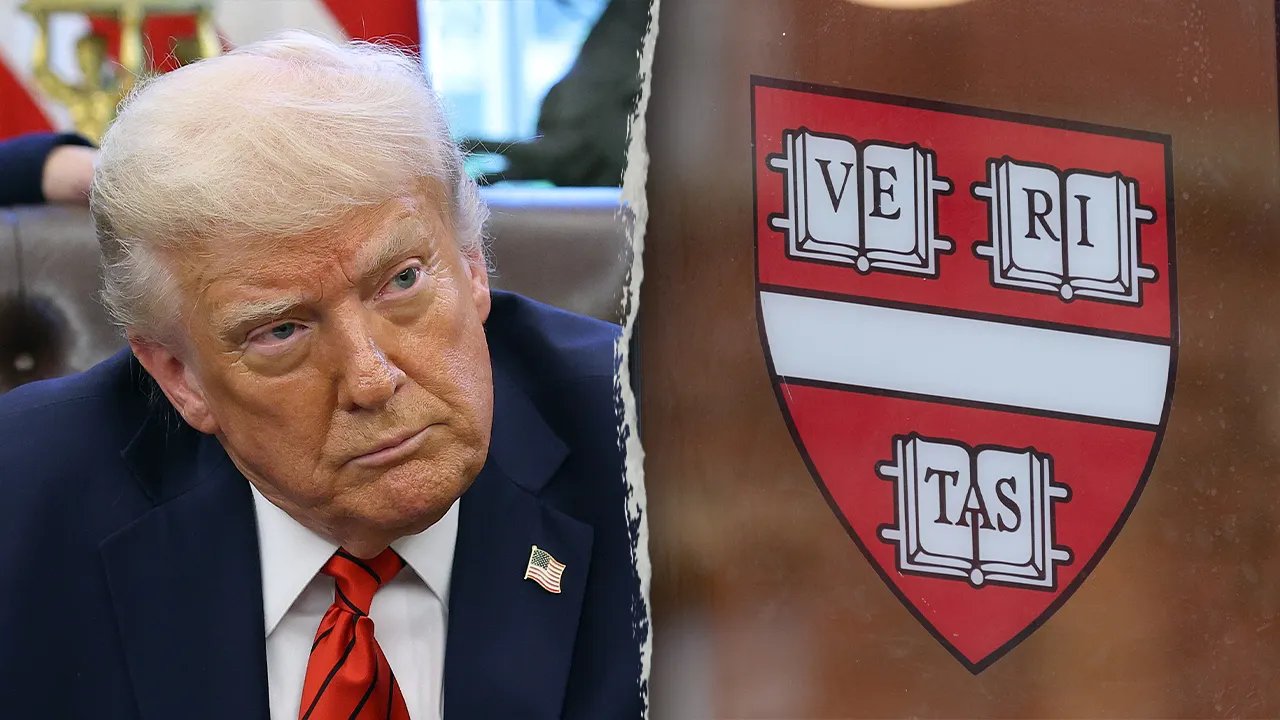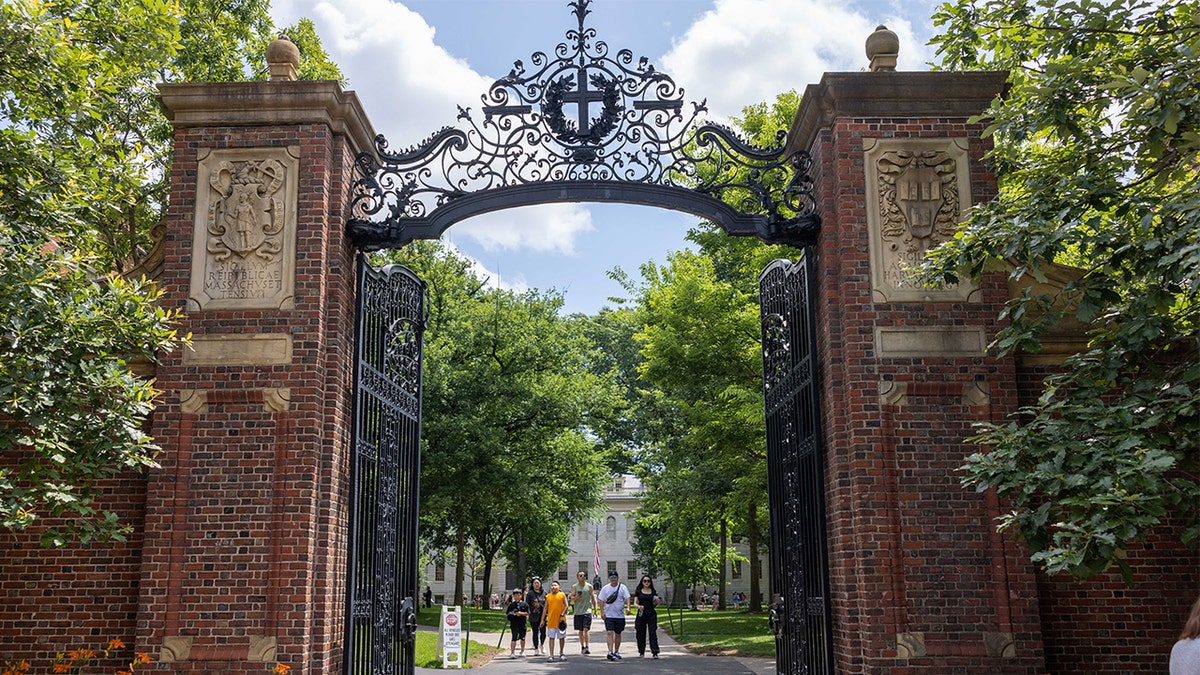INTERNACIONAL
Continued court fights could put Harvard in unwinnable position vs Trump

NEWYou can now listen to Fox News articles!
A federal judge in Massachusetts on Thursday granted Harvard University’s emergency request to block, for now, the Trump administration’s effort to ban international students from its campus, siding with Harvard in ruling that the university would likely suffer «immediate and irreparable harm» if enforced.
The temporary restraining order from U.S. District Judge Allison D. Burroughs blocks the administration from immediately stripping Harvard of its certification status under the Student and Exchange Visitor Program, or SEVP — a program run by Department of Homeland Security (DHS) that allows universities to sponsor international students for U.S. visas.
Burroughs said in her order that Harvard has demonstrated evidence it «will suffer immediate and irreparable injury before there is an opportunity to hear from all parties,» prompting her to temporarily block the SEVP revocation.
Still, some see the order as a mere Band-Aid, forestalling a larger court fight between Harvard and the Trump administration — and one that Trump critics say could be unfairly weighted against the nation’s oldest university.
STATE DEPARTMENT NOW SCRUTINIZING ALL VISA HOLDERS ASSOCIATED WITH HARVARD
Banners hang outside the Harry Elkins Widener Memorial Library at the Harvard University campus in Cambridge, Massachusetts, on May 27. (Sophie Park/Bloomberg)
«Ultimately, this is about Trump trying to impose his view of the world on everybody else,» Harvard Law professor Noah Feldman said in a radio interview discussing the Trump administration’s actions.
Since President Donald Trump took office in January, the administration has frozen more than $2 billion in grants and contracts awarded to the university. It is also targeting the university with investigations led by six separate federal agencies.
Combined, these actions have created a wide degree of uncertainty at Harvard.
The temporary restraining order handed down on Thursday night is also just that — temporary. Though the decision does block Trump from revoking Harvard’s SEVP status, it’s a near-term fix, designed to allow the merits of the case to be more fully heard.
Meanwhile, the administration is almost certain to appeal the case to higher courts, which could be more inclined to side in favor of the administration.
And that’s just the procedural angle.
JUDGES V TRUMP: HERE ARE THE KEY COURT BATTLES HALTING THE WHITE HOUSE AGENDA

Harvard President Alan Garber acknowledges an extended round of applause during Harvard University’s commencement ceremonies in Cambridge, Massachusetts, on May 29. (AP Photo/Charles Krupa)
Should Harvard lose its status for SEVP certification — a certification it has held for some 70 years — the thousands of international students currently enrolled at Harvard would have a very narrow window to either transfer to another U.S. university, or risk losing their student visas within 180 days, experts told Fox News.
Some may opt not to take that chance, and transfer to a different school that’s less likely to be targeted by the administration — even if it means sacrificing, for certainty, a certain level of prestige.
Regardless of how the court rules, these actions create «a chilling effect» for international students at Harvard, Aram Gavoor, an associate dean at George Washington University Law School and a former Justice Department attorney, said in an interview.
Students «who would otherwise be attending or applying to Harvard University [could be] less inclined to do so, or to make alternative plans for their education In the U.S.,» Gavoor said.
Even if the Trump administration loses on the merits of the case, «there’s a point to be argued that it may have won as a function of policy,» Gavoor said.

People walk through the gate on Harvard Yard at the Harvard University campus in Cambridge, Massachusetts, on June 29, 2023. (Getty Images)
Meanwhile, any financial fallout the school might see as a result is another matter entirely.
Though the uncertainty yielded by Trump’s fight against Harvard could prove damaging to the school’s priority of maintaining a diverse international student body, or by offering financial aid to students via the federally operated Pell Grant, these actions alone would unlikely to prove financially devastating in the near-term, experts told Fox News.
Harvard could simply opt to fill the slots once taken by international students with any number of eager, well-qualified U.S.-based applicants, David Feldman, a professor at William & Mary who focuses on economic issues and higher education, said in an interview.
Harvard is one of just a handful of American universities that has a «need-blind» admissions policy for domestic and international students — that is, they do not take into consideration a student’s financial need or the aid required in weighing a potential applicant. But because international students in the U.S. typically require more aid than domestic students, replacing their slots with domestic students, in the near-term, would likely have little noticeable impact on the revenue it receives for tuition, fees and housing, he said.
«This is all about Harvard, choosing the best group of students possible,» Feldman said in an interview. If the administration successfully revokes their SEVP certification, this would effectively just be «constraining them to choose the second-best group,» he said.
«Harvard could dump the entire 1,500-person entering class, just dump it completely, and look at the next 1,500 [applicants],» Feldman said. «And by all measurables that you and I would look at, it would look just as good.»
Unlike public schools, which are subject to the vagaries of state budgets, private universities like Harvard often have margins built into their budgets in the form of seed money that allows them to allocate more money towards things they’ve identified as goals for the year or years ahead.
This allows them to operate with more stability as a result — and inoculates them to a larger degree from the administration’s financial hits.
CLICK HERE TO GET THE FOX NEWS APP
«Uncertainty is bad for them,» Feldman acknowledged. But at the end of the day, he said, «these institutions have the capacity to resist.»
«They would rather not — they would rather this whole thing go away,» Feldman said. But the big takeaway, in his view, is that Harvard «is not defenseless.»
INTERNACIONAL
Key military sites targeted inside Iran as part of coordinated US-Israeli strikes

NEWYou can now listen to Fox News articles!
In coordinated, sweeping U.S.–Israeli strikes on Iran in the predawn hours of Saturday, key military and nuclear-linked sites were targeted inside the country.
The strikes focused on what U.S. officials described as high-value Iranian targets, which included Iran Revolutionary Guard Corps (IRGC) command and control facilities, naval assets and underground sites believed to be associated with Iran’s nuclear program.
In addition, Iranian air defense weapons, missile and drone launch sites, and military airfields were also targeted, according to officials.
Israeli forces targeted sites linked to Iran’s Supreme Leader Ayatollah Ali Khamenei, a senior Israeli official confirmed to Fox News.
President Donald Trump confirmed Saturday afternoon that Khamenei had been killed in a strike. He is among more than 40 senior Iranian security and regime figures killed in the attack, a senior Israeli official told Fox News.
In coordinated, sweeping U.S.–Israeli strikes on Iran in the predawn hours of Saturday, key military and nuclear-linked sites were targeted inside the country. (Fatemeh Bahrami/Anadolu via Getty Images)
«Khamenei, one of the most evil people in History, is dead,» Trump wrote in a Truth Social post. «This is not only Justice for the people of Iran, but for all Great Americans, and those people from many Countries throughout the World, that have been killed or mutilated by Khamenei and his gang of bloodthirsty THUGS.»
He also claimed that the IRGC is seeking immunity from the U.S.
The leaders had all been meeting at a compound in Tehran on Saturday morning.

Iran’s Supreme Leader Ali Khamenei was killed in the strikes, President Donald Trump confirmed. (Iranian Leader Press Office/Anadolu via Getty Images)
FBI RAISES COUNTERTERROR TEAMS TO HIGH ALERT AMID IRAN TENSIONS
The strikes were moved up due to the «target of opportunity,» multiple sources told Fox News, which is why the strikes happened in the daytime in Iran, keeping the element of surprise. «There was a deliberate decision to accelerate the timeline,» one source said.
The campaign, which Trump described overnight from Mar-a-Lago as the beginning of «major combat operations» in the region, encompasses multi-geographic targets in an effort to overwhelm Iran’s defensive capabilities.

People watch as smoke rises on the skyline after an explosion in Tehran on Saturday. (AP Photo)
ISRAEL’S LARGEST EVER MILITARY FLYOVER HAMMERS IRANIAN MILITARY TARGETS
The strikes could also continue for multiple days.
CLICK HERE TO DOWNLOAD THE FOX NEWS APP
Trump said the campaign aimed to devastate Iran’s military, dismantle its nuclear program, and he urged the Iranian people to «take over» their government.
Tomahawk cruise missiles were used in the first strikes of the operation, called Operation Epic Fury, along with one-way attack drones that were used for the first time, according to a U.S. official.
Fox News’ Liz Friden, Morgan Phillips, Amanda Macias, Alexandra Koch and Kelley Kramer contributed to this report.
war with iran,iran,world,israel,military
INTERNACIONAL
Tras el ataque a Irán, tambalea la Revolución Islámica y Trump apuesta a una rebelión interna

El ataque conjunto de Estados Unidos e Israel contra Irán, que provocó la muerte del ayatolá Ali Jamenei, dejó a la Revolución Islámica frente a un riesgo de colapso inminente, pero al mismo tiempo abrió una fuerte incertidumbre sobre el futuro de un país jaqueado por un frente interno en ebullición y una oposición dividida.
Donald Trump dejó en claro que el objetivo es un “cambio de régimen”, pero el Pentágono es consciente de que no bastará usar la fuerza militar para derrocar al gobierno de los ayatolás.
Leé también: Trump confirmó que el líder supremo de Irán murió en los ataques coordinados de Israel y EE.UU.
El llamado del presidente estadounidense a la población iraní para que tomen el control del gobierno dejó en evidencia que Washington apuesta a una rebelión interna bajo el impulso de la debilidad del poder religioso-militar y las protestas de los últimos dos meses que dejaron miles de muertos.
Pero hay dos hechos palpables: 1) el discurso de Trump no llega a la población iraní por el cierre de internet y telefonía a nivel nacional y 2) no hay a simple vista una Delcy Rodríguez local que pueda asumir un gobierno tutelado como el que emergió en la Venezuela chavista tras el ataque del 3 de enero.
De lo contrario, si el gobierno teocrático no sobrevive, el riesgo de caos es total, con el peligro latente de una desintegración nacional como la que ocurrió en Irak, Libia y Siria y con graves consecuencias geopolíticas. En Washington no olvidan que la crisis siria e iraquí llevó a la irrupción del Estado Islámico (ISIS).
El rol de Reza Pahlavi, el heredero del sha
El “príncipe” Reza Pahlavi, heredero del fallecido sha de Irán Mohammad Reza Pahlavi, derrocado en 1979 por la Revolución Islámica, no tiene hoy ningún tipo de influencia real en la sociedad iraní.
Desde hace meses busca posicionarse como el hombre indicado para una eventual transición en su país, aunque sus detractores minimizan su llegada en el Irán profundo y hasta destacan que no maneja bien el farsi.
Un exiliado iraní porta un cartel con la imagen de Reza Pahlavi en Londres (Foto: REUTERS/Toby Melville)
Sus videos y mensajes subidos a sus redes sociales de las últimas semanas, en los que llama a redoblar las protestas contra la Revolución Islámica que derrocó a su padre, no lograron posicionarlo como un líder visible en el país. Su apoyo está basado en el exilio.
Reza Pavhlavi “no tiene una red organizada sobre el terreno y sigue siendo una figura divisiva” en la sociedad iraní, dijo en una entrevista reciente con TN el analista Ali Vaez, encargado de temas iraníes del Crisis Group, una ONG especializada en la resolución de conflictos.
Leé también: El Gobierno refuerza la seguridad en la Embajada de Israel y activa el protocolo de alerta en las fronteras
Lo mismo sucede con la oposición iraní. No solo se encuentra muy dividida, sino que además sus referentes están fuera del país.
“Ningún grupo de oposición externo tiene una base amplia de apoyo” en el territorio, indicó.
Las protestas que sacudieron Irán desde fines de diciembre no tuvieron “cabezas” visibles. Incluso comenzaron como un reclamo económico ante la difícil situación del país cuando un grupo de comerciantes salió a las calles a manifestar su descontento por la elevada inflación.
La protesta ganó adeptos y el país pronto se incendió bajo una marea de manifestantes descontentos con el gobierno. Pero no hubo líderes ni rostros que arrastraran multitudes, bajo un esquema de represión sistemática.
¿Hay una Delcy Rodríguez iraní?
A menos que Trump sorprenda con una jugada como la que emergió en la Venezuela chavista tras la captura de Nicolás Maduro, en Irán no se observa una Delcy Rodríguez que pueda conducir una transición.
“En el sistema político iraní la máxima autoridad proviene del líder supremo (Ali Jamenei). La máxima autoridad ejerce poder real, y viene institucionalmente respaldada por la guardia revolucionaria, una guardia pretoriana ideológica y económicamente (pragmáticamente) interesada en la supervivencia del régimen. Si bien uno puede conjeturar que algún militar de las guardias revolucionarias podría tomar las riendas del país o intentar hacerlo, en el caso iraní sería mucho más difícil armonizar la ideología del régimen con un esquema de cooperación (o sumisión) con Estados Unidos. Hay muchísima incertidumbre”, dijo a TN el analista Federico Gaón, especializado en Medio Oriente.
Analistas consultados por TN coincidieron en señalar que a Estados Unidos no le conviene un colapso total de la Revolución Islámica, sino el surgimiento de un “núcleo progresista” y moderado, ya sea militar o político de la actual estructura de poder islámica, que tome el lugar de los ultraconservadores comandados por el líder supremo.
Pero hoy el progresismo está representado por el presidente Masoud Pezeshkian, uno de los objetivos de los ataques de este sábado. Buscar una alternativa militar es el premio mayor para Washington.
Es un escenario muy endeble y peligroso. Cualquier tropiezo en este juego de ajedrez geopolítico y militar podría derivar en un terreno hostil que ponga al país al borde de una guerra civil y a la región en un conflicto abierto que sacuda al mundo entero.
Irán, Israel, Donald Trump
INTERNACIONAL
Bill Clinton’s credibility threatened by decades of scandals amid grilling over Epstein ties

NEWYou can now listen to Fox News articles!
Former President Bill Clinton has vigorously denied many of them, allegations of sexual improprieties have punctuated his career and repeatedly made questions about his character the focus of national attention.
His truthfulness is again back in the national spotlight after lawmakers on Friday questioned Clinton about his connections to Jeffrey Epstein — the disgraced financier who died in 2019 while incarcerated on charges of sex trafficking minors.
Clinton has not been implicated in any wrongdoing.
Friday’s questioning, however, is just the most recent entry in a list of questions and controversies that stretches back almost 30 years.
Former President Bill Clinton was pictured in a pool in the newly released Epstein files. The images were released by the Department of Justice on Friday, Dec. 19. (Department of Justice)
Juanita Broaddrick – 1998
Allegations against Clinton began in 1998 when Juanita Broaddrick accused Clinton of raping her when he was running for governor of Arkansas in 1978. In the years since, Broaddrick described attempts she believes the Clintons made to keep her from speaking about the incident.
«I was at a fundraiser, but [Hillary Clinton] caught me before I left, and she came up very friendly and said, ‘Bill and I are so appreciative of everything you do.’ And then her voice changed,» Broaddrick recalled in an interview with Fox News in 2018.
«It frightened me,» she said.
By the time Broaddrick’s allegations became public, the statute of limitations protected Clinton from prosecution for the accusation.
Clinton has denied the claim.
HOUSE REPUBLICANS DESCEND ON CLINTONS’ HOMETOWN FOR HIGH-STAKES EPSTEIN PROBE GRILLING

Clinton was the governor of Arkansas before becoming president. (Getty Images)
Kathleen Willey – 1998
In an interview with Fox, Willey called herself a former friend of Clinton and said she supported him when he launched his presidential ambitions.
«We raised an awful lot of money for him,» Willey recalled.
Willey explained that her husband had fallen on hard financial times, prompting her to turn to the White House in 1993 in hopes of finding a job. Clinton was the president then.
«He sat down on the sofa. I proceeded to tell him what was going on, and I told him, ‘I need a job.’ He took my coffee cup from me and the next thing I knew he had me backed into a corner, hands all over me, trying to kiss me,» Willey said, describing an altercation between the two that took place in a study just outside the Oval Office.
Willey first went public with her allegation in a CBS interview with «60 Minutes» in 1998. Clinton has repeatedly denied the allegation.
Gennifer Flowers – 1992
A former television reporter, Gennifer Flowers claimed that she had a longstanding affair with Clinton from the late 1970’s through 1989.
Years later, she said Clinton’s advances started when she and Clinton met during a reporting assignment.
«He proceeded to come on to me for three months before I decided I wanted to have a relationship with him which at that point was consensual. In today’s standards, it was definitely sexual harassment,» Flowers said in an appearance on the Ingraham Angle in 2018.
The story spread to national media as Bill Clinton waged a presidential campaign, just weeks before the Iowa caucuses.
Clinton, in an interview with 60 Minutes in the fallout of the news, didn’t confirm the allegations from Flowers but said he had «acknowledged causing pain» in his marriage.
MONICA LEWINSKY SAYS BILL CLINTON ‘ESCAPED A LOT MORE THAN I DID’ AFTER WHITE HOUSE SCANDAL

Former President Bill Clinton. (George Bridges / AFP via Getty Images)
Troopergate – 1993
Shortly after President Bill Clinton assumed office, allegations first reported by The American Spectator magazine began to surface that Clinton had used state troopers as governor to arrange sexual encounters with women.
Among them, Larry Patterson, Roger Perry and Danny Ferguson all claimed Clinton had ordered them to facilitate his encounters.
Time magazine quoted the original American Spectator allegations, stating that the troopers had said «their official duties included facilitating Clinton’s cheating on his wife.»
«They were instructed by Clinton to drive him in state vehicles to rendezvous points and guard him during sexual encounters … and to help Clinton cover up his activities by lying to Hillary.»
The allegations about the troopers also became a part of independent counsel Ken Starr’s later investigation of separate cases.
Paula Jones
Jones’ case, which eventually led to Clinton’s impeachment in 1998, began while Clinton was governor of Arkansas.
«I was asked to work the governor’s quality management conference,» Jones recalled in an interview with Sean Hannity in 2016. «His security was hanging out with us, and later that day, he came over and said, ‘The governor would like to meet with you.’»
Jones said she was escorted up to Clinton’s room at a hotel.
«We did some small talk, and then he started kinda getting a little comfortable. He said he liked my curves and then I’m like — I didn’t know what to do. It was him and me in the room,» Jones said.
Jones described how the governor then exposed himself to her before she left the room.
«’I’m not that kind of girl,’» Jones remembers telling Clinton.
After Jones launched a sexual harassment lawsuit in 1991, Ken Starr, an independent counsel who was assigned to the case, began an investigation that would uncover not just the details about the Jones incident but also the Monica Lewinsky scandal that finally led to Clinton’s impeachment in the House of Representatives.
Jones herself was awarded an $850,000 settlement as a result of her private suit.
BILL CLINTON FACES HIGH-STAKES HOUSE GRILLING IN EPSTEIN PROBE AND MORE TOP HEADLINES

An image provided by the Starr team to the House shows Monica Lewinsky, center, and President Bill Clinton, right. (House Judiciary Committee/Getty Images)
Monica Lewinsky – 1998
The case that would eventually lead to Clinton’s impeachment first came to the public’s attention when the Drudge Report picked up a story, initially abandoned by Newsweek, that Clinton was having an affair with an intern at the White House.
«She was a frequent visitor to a small study just off the Oval Office, where she claims to have indulged the president’s sexual preference. Reports of the relationship spread in White House quarters, and she was moved to a job at the Pentagon, where she worked until last month,» the reporting read.
Clinton famously denied the allegations when answering questions under oath from Ken Starr, who, at the time, was investigating Paula Jones’ claims.
«I did not have sexual relations with that woman,» Clinton famously said in an interview at the White House.
Eventually, Clinton’s infidelity was confirmed when a friend of Lewinsky recorded her talking about the affair and turned the tapes over to Starr.
CLICK HERE TO DOWNLOAD THE FOX NEWS APP
Clinton would be forced to admit that he had misrepresented his boldest of assertions. At least one voter in Houston told NBC the admission left him with more questions.
«What else has he lied about?» a man asked reporters.
jeffrey epstein,bill clinton,democratic party,hillary clinton

 CHIMENTOS2 días ago
CHIMENTOS2 días agoAlarma por la salud de Divina Gloria tras salir de Gran Hermano: “La internaron directamente en terapia intensiva”

 CHIMENTOS2 días ago
CHIMENTOS2 días agoGinette Reynal dio una rotunda marcha atrás con una decisión que tomó hace dos meses: “No aguanto más”

 CHIMENTOS2 días ago
CHIMENTOS2 días ago¡Titi revolucionó Gran Hermano! Cuáles son las 5 cosas que ya extraña: «Accesorios, pilates, bondiola, auriculares y bailar»

















